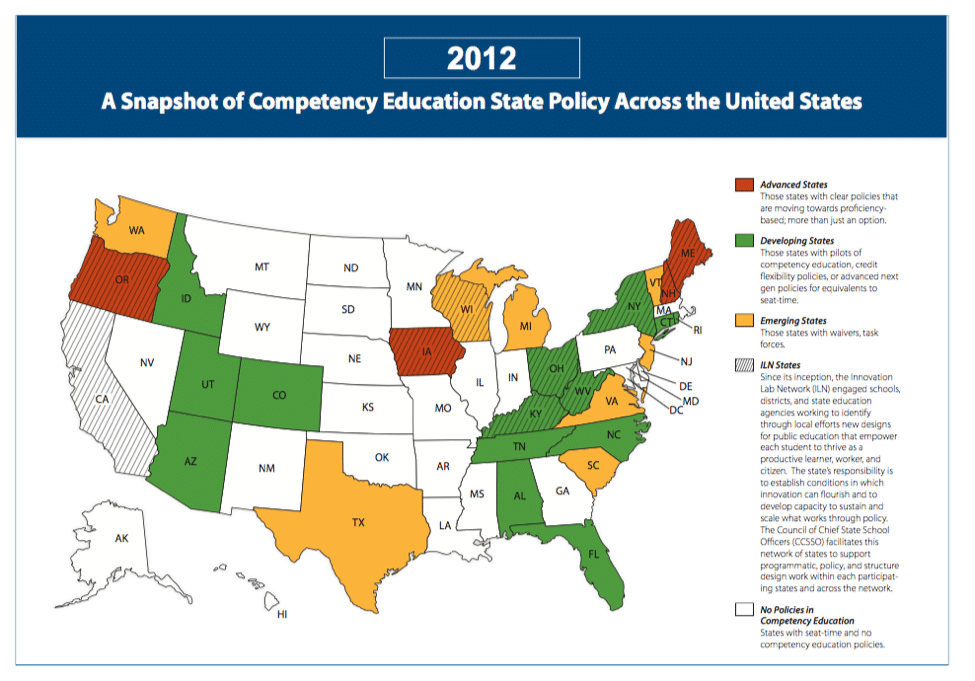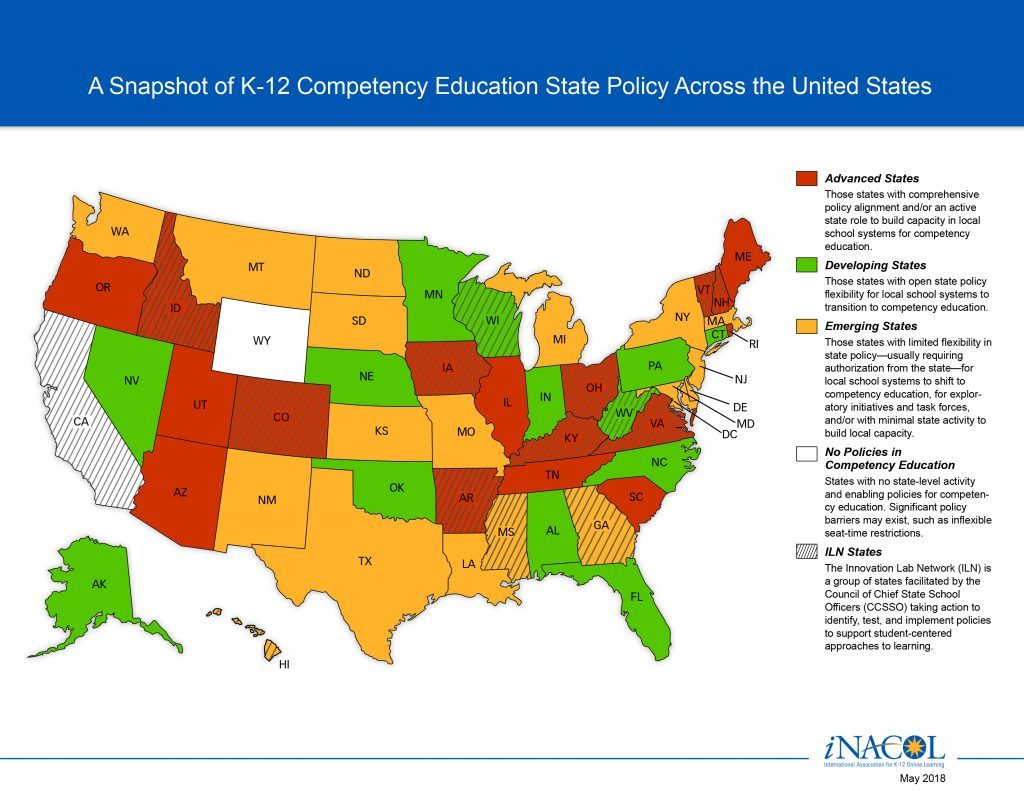CompetencyWorks Releases Updated Competency Education State Policy Map
Education Domain Blog
Today, CompetencyWorks released its updated map for 2018, a snapshot of K-12 competency education state policy across the United States. The map was last updated in November 2017.
You can download a copy of the map here.
In 2018, there are 17 states identified as “Advanced,” shaded in red on the map. These are states that have comprehensive policy alignment and/or have established an active state role to build educator capacity in local school systems for competency education. In 2017, just 10 states were identified as advanced.
Thirteen states (categorized as “Developing” and shaded in green) now have open state policy flexibility for school districts to transition to competency education.
Eighteen states are categorized as “Emerging” and shaded in yellow. These states have limited state policy flexibility and usually require state authorization for school systems to shift to competency-based education.
Only two states show little or no state-level policy activity for competency education. In these states, significant policy barriers may exist, such as inflexible seat-time restrictions.
States Moving Up Into the “Advanced” Category
The following briefly highlights the seven states that have moved up into the “Advanced” category in the updated map:
Virginia
HB 895 of 2016 required the Virginia State Board of Education (Board) to collaborate with community stakeholders to create the Profile of a Virginia Graduate. The bill also requires that for the Class of 2022 and beyond, each graduate take an AP, Honors or IB course or complete an industry certification. In November 2017, the Board approved revised Standards of Accreditation that included graduation requirements for the Class of 2022. These regulations (8VAC20-131-51) went above and beyond the requirements of HB 895 and require all graduates to “acquire and demonstrate foundational skills in critical thinking, creative thinking, collaboration, communication and citizenship in accordance with the Profile of a Virginia Graduate.” Because the state is aligning its Standards of Accreditation and Graduation Requirements with its Profile of a Virginia Graduate, the state is pursuing comprehensive policy alignment and therefore moves the state into the “Advanced” category.
Rhode Island
The state’s Diploma Policy (200-RICR-20-10-2) requires that by 2021, in order to graduate, students must meet state and local course requirements and a performance-based diploma assessment requirement. High schools and middle schools are required to provide students with:
- individualized learning plans,
- multiple opportunities to demonstrate proficiency,
- multiple pathways, and
- personalized learning opportunities built into each school.
Rhode Island’s comprehensive state policies — its proficiency-based graduation requirements and policies requiring schools to provide students with personalized learning experiences — move the state into the “Advanced” category.
Arkansas
The Arkansas Office of Innovation for Education receives an annual grant from the Arkansas Department of Education for capacity-building activities for new learning models, including competency education. The state’s consistent, active role in supporting personalized and competency-based learning models move the state into the “Advanced” category.
Illinois
Public Act 099-0674 (Section 20) created the Illinois Competency-Based Pilot Program, which now includes 15 school districts. The state’s active state role to build capacity at the local level for competency-based education moves it into the “Advanced” category.
South Carolina
The South Carolina Department of Education reallocated approximately $1 million to create the South Carolina Office of Personalized Learning to support capacity-building in more than 130 schools exploring or implementing personalized, competency-based learning. The state’s active role to build educator capacity for new learning models move it into the “Advanced” category.
Kentucky
The state’s approved ESSA plan includes the following: “The accountability system also includes an optional competency-based education and assessment pilot.” Shelby County and Trigg County public schools have been officially accepted into the pilot program. Teams from both districts began work in the spring of 2018, with the intent to launch the competency-based education and assessment pilot program during the 2018-2019 school year. The state department also published a personalized learning glossary in partnership with KnowledgeWorks. The state’s active role to build capacity for competency education moves it into the “Advanced” category.
Tennessee
The state’s ESSA plan says, “The department will continue to explore options to integrate competency-based instructional models by learning from local districts piloting these efforts, other districts and states leading the field in this work, and national partners that provide support into and through competency-based educational strategies.” According to the Tennessee Department of Education, it has allocated $200,000 ongoing from its operating budget for up to 20 planning grants at $10,000 each. Eleven school districts representing 17 schools have submitted letters of intent to participate. Three professional development sessions have been provided with two more days of professional development in June. Districts finalized and submitted implementation plans by the end of May. Four schools are planning to use the Summit Learning model while the other schools are focusing on other aspects of personalized, competency-based learning. All schools are either middle or high school and are beginning with either a grade or content area for the 2018-2019 school year. The active role the state has taken to build educator capacity for competency-based education moves Tennessee into the “Advanced” category.
States Moving Up Into the “Developing” Category
The following briefly highlights the three states that have moved up into the “Developing” category in the updated map:
Nevada
AB 110 of 2017 expands Nevada Revised Statute 389.171, which originally allowed school districts to award students high school credit only through successful performance on an examination, to now enable school districts to award high school credit to students who show mastery through:
- portfolios;
- student work;
- performance tasks; and
- other criteria to determine whether a student has achieved proficiency in a course.
AB 110 of 2017 also creates the Nevada Competency-Based Education Network. The application has been released but participating schools have yet to be announced.
Nevada has open flexibility for local school systems to transition to competency education, which moves the state into the “Developing” category.
Nebraska
Rule 10.004.04C3 enables school districts to “use performance-based curriculum or courses as an option” if the “written description is approved by the local board of education and is on file in the school…” and the “curriculum provides learning opportunities for students equivalent to or greater than those through the [traditional system] for determining instructional units.” In 2016, the state also completed a CBE study committee. The open flexibility for schools to move to competency-based systems moves Nebraska into the “Developing” category.
Indiana
Indiana enables local school boards to provide significant flexibility to schools approved as Innovation Network Schools (IC 20-25.7). Due to the structure of the law, the state cannot deny an Innovation Network School, and therefore, Indiana has open policy flexibility for competency-based systems. There is also a Charter & Innovation Network School Grant Program but this program is not focused on competency-based learning or new learning models. Indiana has open flexibility for local school systems to transition to competency education and that moves the state into the “Developing” category.
A Nationwide Trend Toward Supporting Competency Education
Since 2012, CompetencyWorks has released an annual snapshot map of the United States, categorizing states into levels at which their policy environments and state activities support competency-based education.
Six years ago, far fewer states had policies to support competency-based education. As can be seen from the map below from 2012, nearly half of all states were designated as having no policies to support competency-based education.

There is a significant trend of states creating policies to support competency-based learning across the country. Most of the work to create personalized, competency-based learning environments takes place within local school systems. However, when there is synchronization between policy and practice and when there is collaboration and partnership between policymakers and local school leaders, widespread transformation can take place. Students can access educational opportunities that will enable them to succeed in higher education, in the workplace and in life.
Learn more:
- iNACOL ‒ A National Landscape Scan of Personalized Learning in K-12 Education in the United States
- iNACOL ‒ Current to Future State: Issues and Action Steps for State Policy to Support Personalized, Competency-Based Learning
- CompetencyWorks ‒ Fit for Purpose: Taking the Long View on Systems Change and Policy to Support Competency Education
- iNACOL Issue Briefs
- State Policy & K-12 Competency-Based Education
- Redefining Student Success: Profile of a Graduate
- Redesigning Systems of Assessments for Student-Centered Learning
- Rethinking State Accountability to Support Personalized, Competency-Based Learning in K-12 Education
- State Strategies to Develop Teacher Capacity for Personalized, Competency-Based Learning
Dale Frost is State Policy Director at iNACOL.
